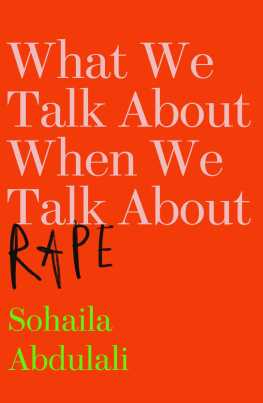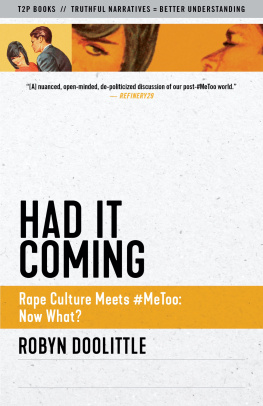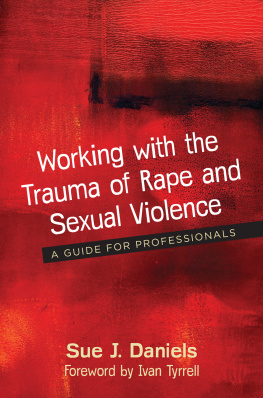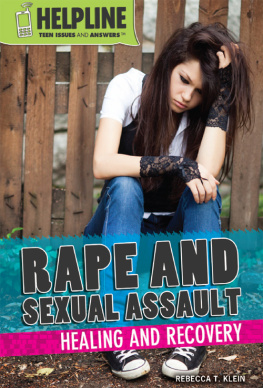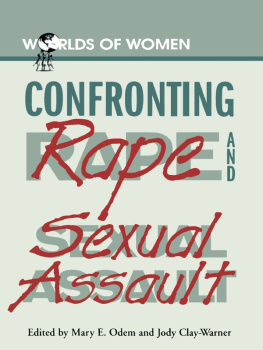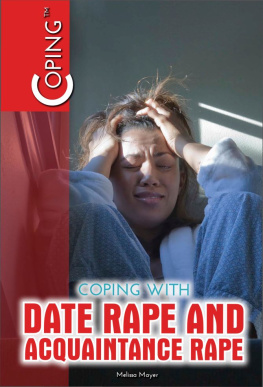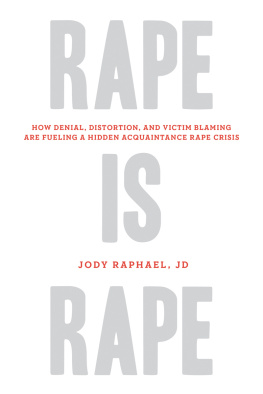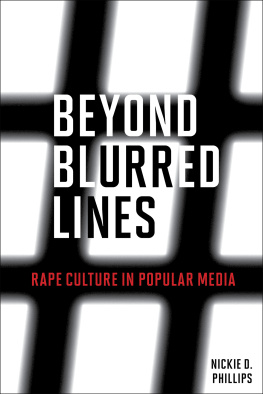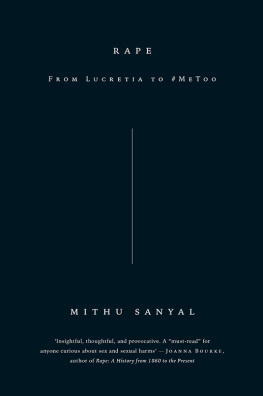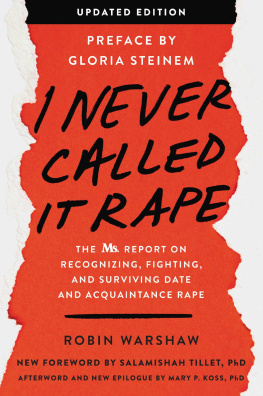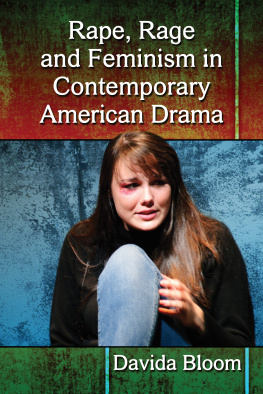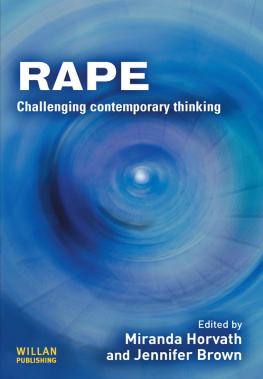Selected praise for
What We Talk About When We Talk About Rape
The right to our own bodies is the first step in any democracy, and, by that measure, women in generalespecially those of us also de-valued by race, caste or classare still subject to an intimate dictatorship. Read the personal stories in What We Talk About When We Talk About Rape, and see how far we have comeand have yet to go.
Gloria Steinem
Unflinching and nuanced Her structure is disruptive and powerful for itnever letting us forget that there is a person who suffers, a body that gets broken. And, when a body is violated, all of society is at risk. This book could not be more timely, nor could there be a better thinkerherself a survivorto write it. If the #MeToo campaign is to have any lasting impact for change in womens circumstances across the world, it will be because of books such as this.
Preti Taneja, author of We That Are Young, winner of the 2018 Desmond Elliott Prize
This is a vital, eye-opening exploration of a crime which affects too many of us, in often unspoken but always life-changing ways. Sohaila Abdulalis book is an honest, wry, engaging and very human testament to the survivors voice as a necessary tool for change. It is filled will truths that will resonate with millions of usand educate millions more.
Winnie M. Li, author of Dark Chapter
An essential contribution to the current conversation about rape, rape culture, and the personal toll of sexual violence in the world today Abdulali captures the complexity of this disturbing topic with clarity, compassion, and insight. Her prose is, at turns, comforting and enraging, confrontational and engaging, timely and timeless, humane and horrific. Yet, throughout, she focuses on our capacity and responsibility to contribute to a safer, healthier, and more fulfilling world for all. Abdulali teaches us that surviving sexual violence is essentially a creative act, and in her brave book she shares her, and many other, inspiring stories of surviving, thriving, and regaining wholeness.
Richard O. Prum, Professor of Ecology and Evolutionary Biology, Yale University, and author of The Evolution of Beauty
Brilliant, frank, empowering, and urgently necessary. A powerful tool for examining rape culture and language on the individual, societal and global level that everyone can benefit from reading.
Jill Soloway
Both hard to read and an amazing, vital read, this is the exact book we all need right nowto do better, we must know more. Empathy is a key character in this book. Sohaila is a brilliant and beautiful writer, and a star and thought leader for our generation.
Alyssa Mastromonaco, author of Who Thought This Was a Good Idea?: And Other Questions You Should Have Answers to When You Work in the White House, and former White House Deputy Chief of Staff
This book is a public square for those who know a lot about rape, and for those who know little. It is a safe space for survivors, and a broad-minded attempt to open the conversation to everyone. Its a global book, relevant in refugee camps and American suburbs.
Sarah McNally, McNally Jackson Books, New York
Know this: the shock is not that Abdulali speaks frankly about rape. The shock is not that she interrogates the content, and limits, of our public discourses about rape culture with candour and warmth, with cool precision and justified rage, with wisdom and, yes, humour. The shock is that there are not more books like this. This is a powerful indictment of the way our socialised silences breed only injustice, fear and disconnection. Abdulali speaks into those voids and misperceptions, using the full register of her humanity in the hope for change. Read it, and do not stop talking.
Dr Sarah Krasnostein, author of The Trauma Cleaner
What We Talk About When We Talk About Rape places the American #MeToo movement in a global context. Drawing on her experiences as a rape survivor and as scholar and advocate, Sohaila Abdulali takes us from the US, to India, South Africa, Mexico, Kuwait, and other countries, providing examples that illustrate both the intense particularity and infuriating similarities of sexual violence around the globe. Courageous, angry, compassionate, informative, hopeful, and wise, this book approaches this hard topic from a variety of angles. She addresses shame and the silencing of survivors, retaliation, victim blaming, the complexities of consent, recovery, and other issues.
Elizabeth A. Armstrong, Professor of Sociology, University of Michigan
Such a lot of insight in this book. I wish I had written it. An international take on the contemporary movement towards learning to talk about rape. The more we talk, the more we learn. The more we learn, the more we can change. Read this book and be part of the change.
Una, author of Becoming Unbecoming
For Samara, Aidan, and Rafe
Teatime forever
Ive used anecdotes from many peoples lives, including my own. I havent made up anything, but I have taken some liberties with names, places, etcetera, to respect peoples privacy. In some cases I have used pseudonyms. Every quote in this book is real, but, if I say As uncle said it, it might actually be Bs father. Its all true, but its not all necessarily true in exactly the order I tell you it is.
The light was draining out of the room, going back through the window where it had come from.
Raymond Carver, Beginners (originally What We Talk About When We Talk About Love)
R APE DRAINS the light. Like J.K. Rowlings fantastically terrifying Dementors, it sucks joy. And, along with draining the light from victims lives, it tends to drain the light from sensible conversation. Discussions about rape are so often irrational, and sometimes outright bizarre. Its the only crime to which people respond by wanting to lock up the victims. Its the only crime that is so bad that victims are supposed to be destroyed beyond repair by it, but simultaneously not so bad that the men who do it should be treated like other criminals.
I want to let some light back in.
Rape. The word is so harsh. In Hindi, balatkaar. In Finnish, raiskata. In Indonesian, memperkosa. In Arabic, aightisab. In Slovenian, posilstvo. In Zulu, ukudlwengula. The English word rape probably comes from the Latin rapereto snatch, to carry off. For the last seven hundred years, its meant to take by force. In Roman law, abducting a woman, whether or not you forced sex on her, was called raptus. Which sounds horribly, misleadingly, like rapture. Then again, the Oxford English Dictionary drily informs me that it comes from the word rapa, which means turnip. Even the definition is confusing.
I think about random examples from my own lifea male friend on a Nicaraguan beach with a woman friend, enjoying the night until someone beat him unconscious and raped her; a woman friend on another beach, in Greece, enjoying the day until a group of cops raped her; another woman really excited about a romantic evening with her new boyfriend until he grabbed her and forced himself on her. How have we managed to evolve as a species that is riddled with rape? When did we give ourselves permission to become this way? Sometimes I wonder if we consider bad table manners a worse breach of protocol than forcing a random object up a personal orifice.
I will be interested to see which shelves this book ends up on in bookstores. Essays? Not really. Sociology? Not learned or academic enough. Psychology? No, too opinionated. Research? Not comprehensive enough. Memoir? I hope not. Its easy to say what this book isnt, because it doesnt neatly fit into any genre. This is just what I want, because in this space lies my freedom. I can do whatever I want, and I have. I can roam around the world and the internet, stopping where I want, chatting with whoever takes my fancy, and drawing my own conclusionsor not. I am very willing to take shameless advantage of my street cred as a rape survivor to generalize and opine, but I speak only for myself, not for anybody else.

